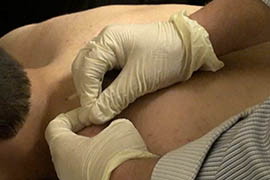Cronkite News has moved to a new home at cronkitenews.azpbs.org. Use this site to search archives from 2011 to May 2015. You can search the new site for current stories.
Senate panel endorses bill to regulate dry needling by physical therapists
PHOENIX – A Senate committee endorsed legislation Wednesday that would allow the Arizona State Board of Physical Therapy to regulate the practice of dry needling, a technique using thin needles to stimulate muscles for pain relief.
The board approved dry needling as an accepted physical therapy practice in October 2013 but said it didn’t have the authority to regulate or make rules for practitioners of dry needling, according to Charles Brown, executive director for the board.
SB 1154, authored by Sen. Kelli Ward, R-Lake Havasu City, would require the physical therapy board to set up standards for training and education by July 1, 2015. It would also allow the board to take disciplinary action against physical therapists who practice dry needling without meeting these qualifications and standards.
The Senate Health and Human Services Committee unanimously approved the bill, forwarding it to the Senate floor by way of the Rules Committee.
Acupuncturists have taken issue with dry needling, saying physical therapists don’t have the proper training with needles to be working on patients.
Lloyd Wright, a Scottsdale acupuncturist, said the bill doesn’t really address the problem of allowing physical therapists to practice dry needling.
“To give them the power to self-regulate is like putting the fox in charge of the henhouse,” Wright said.
Acupuncturists are the experts on needling, Wright said, and the board doesn’t have enough experience or knowledge to adequately regulate dry needling.
“I’m sure they have a sincere belief that they know what they’re doing, but they don’t know what they don’t know,” Wright said. “Mistakes happen when people think they know what they’re doing.”
Physical therapists, acupuncturists and legislators met twice for stakeholder meetings in the past few weeks to discuss the views of all parties before the bill was announced.
Ward, a physician, said the meetings and talking to experts helped her arrive at the bill.
“I don’t believe that acupuncture and dry needling are the same procedure and that Arizona has to do a better job in defining each so that neither profession steps on the others’ toes,” Ward said in an email.
Ward said she hopes the bill can help acupuncturists and physical therapists work past their differences.
“I have been trying to find a way to clear up the misunderstanding and allow acupuncturists to continue their practice while we separate and define dry needling that PTs have been doing for many years,” she said.
The physical therapy board doesn’t have an official position on the bill yet because it hasn’t had a chance to meet since the bill was announced Monday, said Brown, the executive director. But he said the process of working with legislators has been positive so far.
“The bill does follow the explanation that the board provided and address the issue of the lack of authority for setting standards,” he said.
Sean Flannagan, a physical therapist who practices dry needling, said the bill is a step in the right direction.
“I think we need standards and rules around it,” he said. “It’s a really good thing for public safety. It shows our board is really regulating our profession as it’s supposed to.”
Flannagan characterized the acupuncturists’ view of dry needling as a “turf war,” with one profession looking to regulate another.
But Pete Gonzalez, executive director of the Arizona Acupuncture Board of Examiners, said calling it a turf war is incorrect.
“It’s a question of safety,” he said. “It’s a question of statutory authority and training.”
The Arizona Acupuncture Board of Examiners doesn’t have an official position on the bill yet, according to Gonzalez, though he said he expects board members to have concerns.
“We’re looking at it from the perspective of: is the general public aware and protected?” Gonzalez said. “We think it’s great that people want to do acupuncture or dry needling because it helps. We’re concerned if they have the adequate training to do it.”







